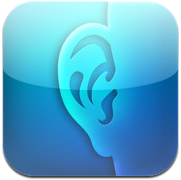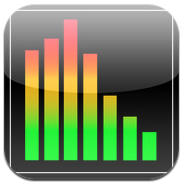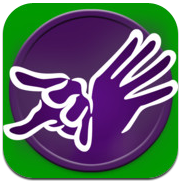Phone Apps for Hearing
This post is for the techie folks. Do you have a smartphone (iPhone or Android)? You are in good shape then, because there are some
great mobile hearing apps that focus on hearing loss and hearing aids.
From sound amplification to captioned movie times, mobile device hearing loss apps provide a wide array of handy services for the hard-of-hearing.
With so many choices available, we have rustled up a list of some of the best hearing test apps on the market. Nonetheless, no hearing aid app can replace a modern hearing aid, just like the ones brought to you by
Audicus Hearing Aids.

uHear: Hearing Test App
uHear lets you test your hearing anywhere and at any time with the push of a button. This hearing test app tests you for the quietest sounds you can hear and how well you hear speech in noise.
A built-in questionnaire helps you and the app assess the quality of your hearing. Once you have taken the tests, a results graph will rank your
hearing loss from mild to profound and warn you if you are at risk of further damage.
Designed by Donald Hayes, Ph.D. Director of Audiology for Unitron Hearing, the uHear app gives you easy-to-read, informed results. Keep in mind that the results are indicative only and you should still consult a professional if you suspect you have hearing loss.
Cost: Free

Captionfish: Hearing Loss App
Particularly ideal for movie buffs,
Captionfish helps you find captioned and subtitled movies playing near you. You can also find out whether the movie is open-captioned (the text is on the screen), rear-window captioned (the text is on the seat in front of you) or closed captioned (using a special system).
With this streamlined hearing loss app, you can find accessible movies within 60 miles of your area. At your command, the app will display movie times, synopses, and theater locations, providing you with all the information you need to enjoy a night out. Captionfish even streams captioned movie trailers, so you know just what to anticipate.
Cost: Free
[optin-monster-shortcode id="bn6lly86xosz4lmd"]

TooLoud?: Hearing Loss App
While we all know loud environments can hurt our hearing, sometimes we don't know when those places are actually too loud.
TooLoud can analyze the sounds in any given space, and let you know immediately whether you are putting your ears at risk.
A live graph provides moment-to-moment updates on the noise level, so you can find the best spot to settle. If you are in an ear-shattering location, the app will alert you with a pop-up warning.
Cost: Free

Hearing Loss Simulator
Imagine an app that can explain hearing loss for you. If you find yourself constantly asking the people around you to speak up, this app will let them know exactly how you feel. With the
Hearing Loss Simulator, you can take pre-recorded common sounds and illustrate how they sound to a person with hearing loss.
You also have the option to record your own voice as a sample. Choose between various degrees of hearing loss to show the difference between mild and severe cases. With this handy app, your close friends and family come one step closer to understanding hearing loss.
Cost: $1.99

SoundAmp R: Hearing Loss App
SoundAmp R lets you use your mobile device like a hearing aid by amplifying sound and speech. Record lectures, presentations or conversations, then play them back with clear, loud sound. Additional functions allow you to bookmark sections of a recording for easy reference, and you can export the files straight to your computer.
For the best results, you will need to use wired headphones and microphones. There is, however, one drawback to SoundAmp: the hearing aid app cannot amplify music or phone calls.
Cost: $4.99

Purple Communications VRS: Hearing Loss App
Purple Communications' Video Relay Service (VRS) helps individuals who are deaf or hard-of-hearing make voice phone calls with American Sign Language. Using a video phone, you would simply sign to a qualified interpreter, who would then speak to whomever you called.
The interpreter will then use sign language to communicate the response to you. VRS is a step up from text, as you can have a faster conversation, interrupt one another and use facial expressions.
Cost: Free for deaf or hard-of-hearing individuals
Test Your Hearing For Free
Source:
Audicus Hearing Aids
by Patrick Freuler





